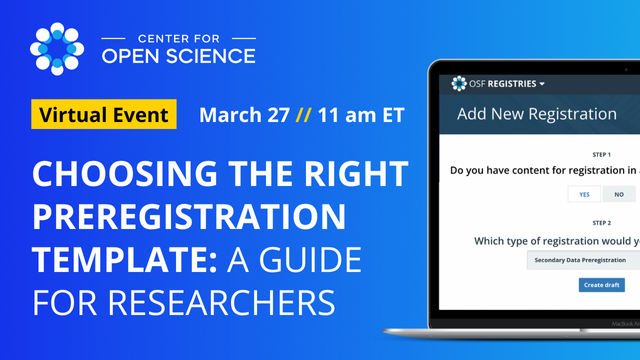Imagine you preregistered your study with directed hypotheses, but did not specify one-tailed or two-tailed testing. Result A is in the predicted direction but p = .05-.09. Result B is in the non-predicted direction but p < .05. Do you report:
Recent searches
Search options
#PreRegistration
Preregistering your research is a great way to boost transparency and rigor. But which template is right for your study?
Join us on March 27 at 11 AM ET for a webinar on choosing the right preregistration template! We’ll explore OSF’s templates for different study types—including experiments, systematic reviews, qualitative methods, and more.
Register now: https://cos-io.zoom.us/webinar/register/6017422230094/WN_4dH6B5M_SMWAcsgpSP-xcQ
PS: I'm sympathetic to those short on time or caught up in job changes. But those pointing to #nullresults didn't understand the point of #preregistration.
Those whose submissions were rejected by journals could still share the results as #preprints.
17 eligible case studies were submitted for our #OpenResearch Award 2024. All eligible case studies will be highlighted here. Today:
#OpenSource #Science for Human-Machine Interaction: Helping machines understand and produce non-literal speech in multilingual contexts, by Xiyuan Gao: https://www.rug.nl/research/openscience/open-research-award/case-studies-list-2024/gao
All eligible case studies from 2024: https://www.rug.nl/research/openscience/open-research-award/case-studies-2024
From @balazsaczel: Don't let the value of confirmatory studies (to test #preregistered hypotheses) eclipse the need for exploratory studies (to develop the hypothesis needed for #preregistration).
https://www.nature.com/articles/d41586-024-03826-z
(#paywalled)
And there is #ISOQOL pushing the #preregistration methodology maybe a bit too far
James offers that the data are available for re-analysis. Especially to the #HubermanLab.
Sounds like an interesting opportunity for a #PreRegistration or #RegisteredReport since the data are at the moment not in the public domain.
Signed. And featured in my #PeerReview seminar yesterday.
I don't think that this is only about #PreRegistration.
One of our #RCTs received this year a 2.5k word review which did not refer to the #registration, statistical analysis plan, protocol, nor submitted appendices
Also extrapolating from the style of that review:
How much anger and frustration that person could have avoided.
Edit: Link (Google Doc):
https://docs.google.com/document/d/1Y9Y4ilH06xvcKKreZnZE7pf_6kd6GHuRI6u6U45f3vs/edit?pli=1
Going to do a controlled experiment that I’d like to preregister with y’all. I found https://octodon.social/@22/110805874531361356 by searching my backups for an article about continents but I have zero memory of that chart. I wonder what % of stuff I bookmarked (in my backups) or tooted I remember.
Some stuff of course yeah memorable articles I still invoke etc. but I bet if the things I backed up or tooted ~12 months ago I remember only 10% of them.
Will write a little script that queries my backups and randomly picks 25 entries between 9 and 15 months ago, and similarly 25 toots/threads. So my preregistration is that I’ll remember reading or writing 5 of these entries in total, with my 90% confidence interval being between 3 and 15.
(Caveat I’m not very good at benchmarking subjective probability so I can’t be sure how good of a map that 3 and 15 are. Sorry.)
Finally, I can imagine some ambiguity in answering “do I remember reading or writing…”. If I remember the title of the bookmark but not the content, or the context of the toot but not sending it, it counts as “remembering”. #preregistration
(Bibliography: on backups see https://octodon.social/@22/109350842847003446. On preregistration see Daniel Kahneman, “The crisis has been great for psychology. In terms of methodological progress, this has been the best decade in my lifetime. Standards have been tightened up, research is better, samples are larger. People pre-register their experimental plans and their plans for analysis” https://www.edge.org/adversarial-collaboration-daniel-kahneman)
Pandora's box is open: Charles University researchers demonstrate that #ChatGPT can create convincing, fraudulent "scientific" papers
https://www.jmir.org/2023/1/e46924/
Huge implications for #peerReviewed
#Science and (another) strong argument for #preregistration of studies
We often see social sciences try to emulate natural sciences. Here's a nice example of the reverse.
https://academic.oup.com/aje/advance-article/doi/10.1093/aje/kwad007/6982711
"Empirical evidence from the social sciences suggests such [#opendata, #opencode & #preregistration] practices are feasible, can improve analytic #reproducibility, and can reduce selective reporting. In academic #epidemiology, adoption of #openscience practices has been slower than in the social sciences [and could improve]."
Exploratory hypothesis testing:
Nice to see that our article “Exploratory hypothesis tests can be more compelling than confirmatory hypothesis tests” (https://doi.org/10.1080/09515089.2022.2113771), which was published 4 months ago, is the most read article in @PhilosophicalPsychology in the last 12 months: https://www.tandfonline.com/action/showMostReadArticles?journalCode=cphp20
#Psychology
#PhilosophyOfScience
#PhilSci
#MetaScience
#Preregistration
#HypothesisTesting


